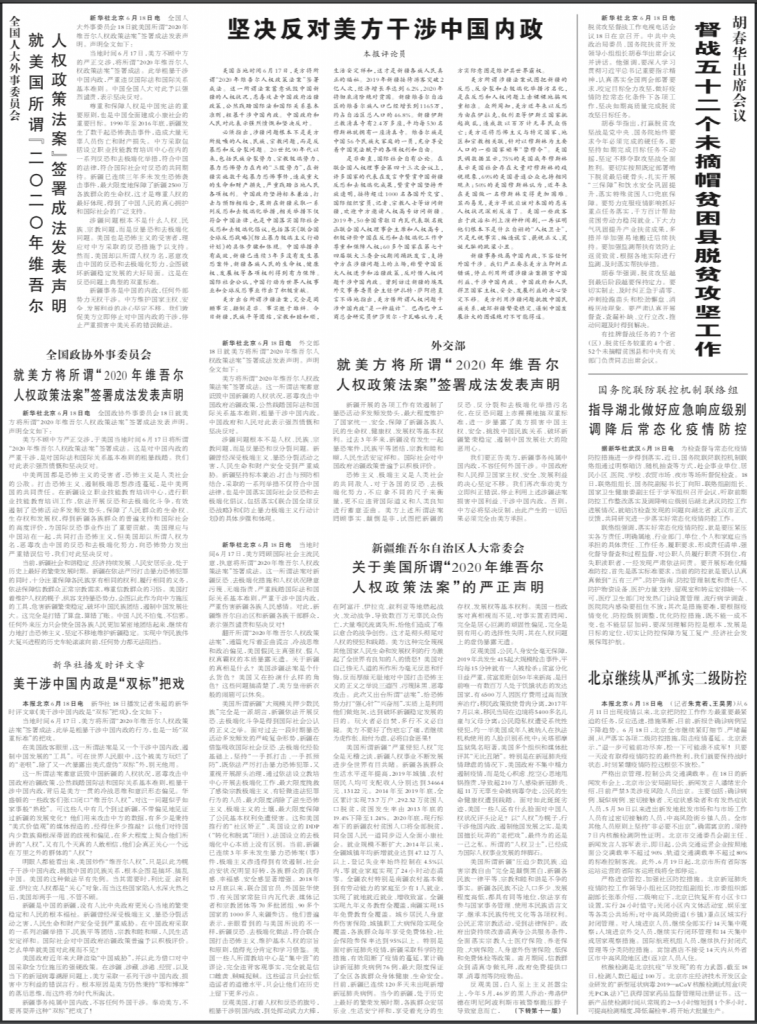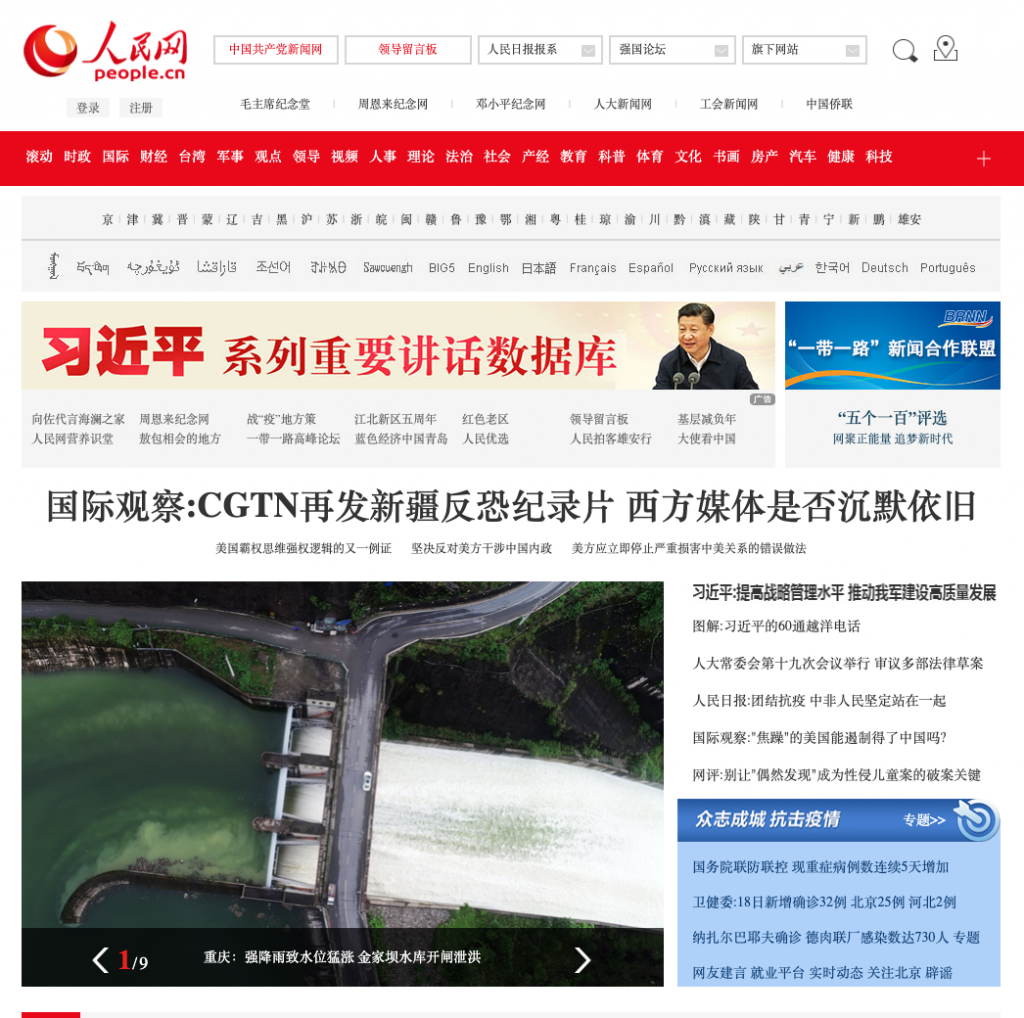US President Donald Trump signed legislation earlier this week calling for sanctions against Chinese officials for the country’s repressive treatment of ethnic Uighurs in its northwestern region of Xinjiang, where more than one million (and perhaps as many as three million) are thought to be held in detention camps. The legislation was passed overwhelmingly in the US Congress last month, with a bipartisan vote of 413 to 1 in favour.
While the US has steadily been the subject of official ire in China’s party-run press over the past two years, as tensions have rankled over such issues as trade and Hong Kong, a series of tough-worded commentaries and responses today are the best illustration in recent memory of what apoplectic rage looks like in the pages of the CCP’s usually dry and jargon-filled People’s Daily.
Here is an image of page three of today’s paper, which includes six pieces dealing with Xinjiang covering fully three-quarters of the space.

The central piece is written by “a commentator from this paper,” or benbao pinglunyuan (本报评论员), which clearly identifies it as having been written by top staff at the paper to represent the views at the most senior levels of the Party. The same byline was given, to provide just one example among many, to a July 2019 commentary expressing hard-line views on protests in Hong Kong.
”This so-called bill deliberately vilifies the human rights situation in China’s Xinjiang,” the commentary begins, “maliciously attacking the Chinese government’s policies in governing Xinjiang and flagrantly trampling on international law and the basic norms of international relations, amounting to gross interference in China’s internal affairs. The Chinese government and people express strong indignation and firm opposition to this.”
Next, the commentary rejects the use of the frame of human rights to discuss matters in Xinjiang at all, insisting instead that the core issues are terrorism and separatism.
It must be pointed out that the Xinjiang-related issue is not a question of human rights, ethnicity, or religion as the US has clamored about, but rather is about anti-terrorism and anti-secession. Since the 1990s, the “three forces,” including ethnic separatist forces, religious extremist forces, and violent terrorist forces, have carried out thousands of violent terrorist incidents in Xinjiang, causing significant loss of life and property, and seriously trampling on the rights of the local people.
In quite typical fashion, the commentary sidesteps the very real and well-documented facts and questions about China’s policies in Xinjiang and their human costs, and resorts instead to a list of superficial numbers and percentages, as though reciting these can quantitatively deny accounts of torture and invasive surveillance.
The introduction of the so-called Xinjiang-related bill by the US side completely ignores the facts and overturns right and wrong. But facts speak louder than words. In Xinjiang today, ethnic equality and unity, religious harmony, and stable and peaceful lives are all for the real well-being of people of all ethnic groups. In 2019, Xinjiang received more than 200 million tourism journeys, and the economy grew at a rate of 6.2 percent. In 2020, absolute poverty will be eliminated completely [in the region]. The Uighur population in Xinjiang has grown to 11.65 million, accounting for about 46.8 percent of the total population of the autonomous region. In Xinjiang, there are more than 24,000 Islamic mosques, and there is on average one mosque for every 530 Muslims.
The next rhetorical strategy is to turn the accusations around on the US, alleging deep hypocrisy. “The so-called Xinjiang bill in the US attempts to blacken the reputation of anti-terrorism, anti-secession, and de-extremification measures in Xinjiang, and this is a naked double standard on anti-terrorism and human rights issues,” the commentary says. “As everyone knows, the United States has provoked wars in Islamic countries such as Iraq and Syria in recent years on the grounds of counter-terrorism, resulting in millions of innocent casualties.”
Finally, the piece concludes – with an obligatory note on non-interference, that concept long so central to Chinese foreign policy, and national sovereignty – by turning the focus to a buzzword China habitually uses to neutralize and insulate all concrete questions of human rights: development.
Affairs in Xinjiang are purely China’s internal affairs, and we tolerate no foreign interference. We sternly demand that the US side immediately correct its mistakes and stop using the so-called Xinjiang bill to harm China’s interests and interfere in China’s internal affairs. The Chinese government and people are determined to defend national sovereignty, security, and development interests. The attempts by the US side to use Xinjiang issues to incite disharmony in China’s ethnic relations undermine the prosperity and stability of Xinjiang, and efforts to contain China’s development and growth cannot possibly prevail.
Following this commentary at the center of the page are statements from the Ministry of Foreign Affairs and from the People’s Government of the Xinjiang Uighur Autonomous Region. The latter also uses a permutation of “hurting the feelings of the Chinese people, a phrase that has through the decades been routinely used by the CCP to express condemnation in instances of serious international conflict and disagreement, making broad claim over popular sentiment:
This so-called bill wantonly slanders and unjustifiably accuses counter-terrorism and de-radicalization measures and the human rights situation in Xinjiang, severely trampling on international law and basic norms of international relations, seriously interfering in China’s internal affairs, and seriously hurting the feelings of people of all ethnic groups in Xinjiang. In response, the Xinjiang Uighur Autonomous Region and the cadres and people of all ethnic groups in Xinjiang strongly express their condemnation and firm opposition!
Like the piece by “a commentator from this paper,” this commentary from the Xinjiang leadership tries to support its case by turning the accusations back on the United States, with a series of paragraphs beginning with the words, “Looking back at America . . . “ It concludes by dismissing the US bill as “ a piece of waste paper that will be swept onto the garbage heap by the force of justice!”
Also worthy of note is an official commentary from Xinhua News Agency in the bottom left-hand corner of the page. The piece accuses the US once again of “double standards,” and suggests that “the US side” is possessed by “Cold War thinking” and “ideological prejudice.”
People’s Daily Online is also hitting hard on the Xinjiang bill today, with a prominent headline at the top of the homepage announcing the re-broadcast of an official documentary on Xinjiang by state broadcaster CGTN. The documentary is called: “Tianshan Still Standing: Memories of Fighting Terrorism in Xinjiang.”

[Featured image of a mosque in the Xinjiang capital of Urumqi, by Brett Vachon available at Flickr.com under CC license.]




















